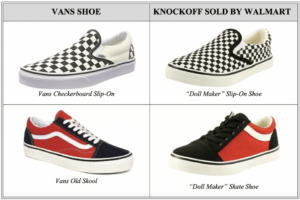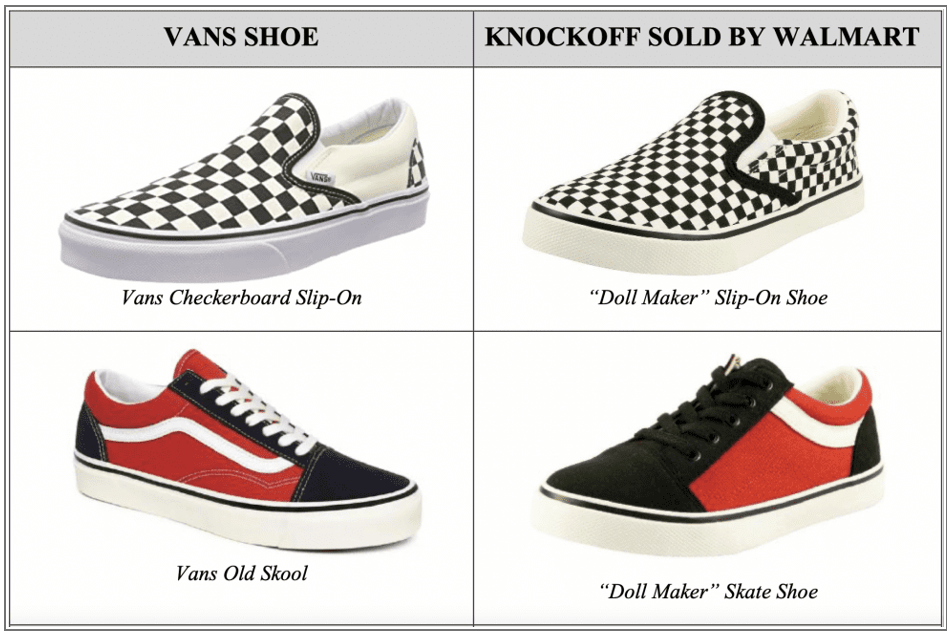The multinational retail store giant Walmart, was embroiled in a trademark dispute with Vans, a popular brand known for its distinctive shoe designs. This legal squabble arose when Vans indicted Walmart for selling shoes that bore an unsettling resemblance to Vans’ iconic styles. The dispute centered on Walmart’s alleged infringement of Vans’ trademarked designs, with the plaintiff claiming that the parallels were “confusingly analogous”, rather than coincidental.
Vans initially sued Walmart in November 2021 for allegedly selling over 20 pairs of shoes that infringed on its property rights. A federal judge eventually issued a preliminary injunction and said that Vans would likely be issued a win in its case against Walmart and that the company would “suffer irreparable harm” without an injunction.
In the initial complaint, Walmart was accused of trademark infringement, unfair competition, and false designation of origin. Walmart, according to the lawsuit, “flooded the market with cheap, low-quality, and confusingly similar shoes that harmed Vans’ goodwill and reputation.” Vans provided examples of Walmart sneaker designs that closely resemble Vans products, such as the SK8-HI and Old Skool shoes.
March 2022 Order
Vans “succeed[ed] in showing that its trademarks and trade dresses” – from its side-stripe logo and the OLD SKOOL shoe trade dress to other “distinctive” footwear designs, such as its Checkerboard Slip-On – are “valid and protectable,” according to Judge Carter’s March 2022 order. At the same time, the judge determined that a “‘reasonably prudent consumer’ in the marketplace is likely to be confused about the origin of (Walmart) goods bearing one of the marks.” As a result, the court ordered Walmart and those acting on its behalf to stop selling the allegedly infringing footwear in the United States for the duration of the litigation.
Vans argued in an amended complaint filed in November 2022 that Walmart was still infringing on its sneaker-centric trademarks in the United States, despite the preliminary injunction imposed by the court. Furthermore, the Southern California-based footwear company claimed that Walmart had increased its alleged infringement by selling “many of the infringing shoes (as well as additional infringing shoes designed in collaboration with (fellow defendant) ACI International) in other countries, including Canada.”
Current Scenario
Vans and Walmart have reached an agreement in a trademark dispute that pitted the iconic sneaker-maker against the retail giant over the latter’s alleged “campaign to knock off virtually all of [Vans’] bestselling shoes” while infringing on the iconic sneaker-maker’s trademark rights. Counsels for Vans and its owner VF Corp., Walmart, and Walmart supplier ACI International alerted a U.S. District Court for the Central District of California judge on Wednesday that they have reached a settlement and plan to file a consented permanent injunction and then a joint motion to dismiss with prejudice shortly thereafter, the details for which were not disclosed.
Conclusion
This clash between Vans and Walmart epitomizes brands’ imperishable struggle in guarding their Intellectual Property. Further, it also accentuates the significance of Trademark protection for a brand, design, identity, and consumer perception. Though the resolution’s finer details are not disclosed, it memorializes the importance businesses place on protecting their creative assets from unauthorized replication and dilution. Finally, the agreement represents a victory for Vans, reinforcing the message that preserving brand identity and debating alleged carbons are non-negotiable imperatives. While the specifics of the resolution are unknown, the conclusion of the shoe deals in question serves as a significant palm for Vans’ unwavering commitment to defending its distinctness in the competitive geography of fashion and retail.

Contributors : Abha Shah and Bhumika Sharma

